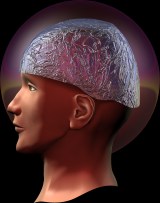I find this disturbing. I have to wonder if some military might put this to use on their soldiers or something.
Moral judgments can be altered ... by magnets
I'm quite curious as to the results of further studies about this.
Moral judgments can be altered ... by magnets
Liane Young said:“You think of morality as being a really high-level behavior,” she says. “To be able to apply (a magnetic field) to a specific brain region and change people’s moral judgments is really astonishing."
I'm quite curious as to the results of further studies about this.

